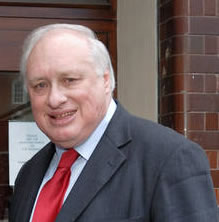
I was asked to give a short talk at a conference this weekend on environmental policy and the influence of Keynes. Now Keynes was a major, if not the major, economic thinker of the first half of the 20th century at a time when environmental policy was rather more modest in its scope than it is today, and his great contributions to economic thought lay in an analysis of the behaviour and role of government in the modern era and the limits to the classical assumptions of economics that the modern era exposed. What does this say about the environment?
The connection was made by Stephen Haseler, at the same conference, who used the term Keynesianism not as an economic concept but as a political one It describes the social democratic notions that dominated politics between 1945 and 1979, that the government has a right and a duty to intervene in the economy in the interests of society. The market should be made to serve the people, and not the other way round. In this sense, there is a strong connection with the environment, in a way that is a of great significance to federalists.
The standard narrative of federalism explains that economic interdependence, technological change and the discoveries of environmental science render national regulation increasingly ineffective and that supranational regulation is needed to replace it. This is opposed by interests and arguments that extol the virtues of the national state, its evident limits notwithstanding. But there is an additional opposing force to federalism, which is the argument against regulation as such. The increasing irrelevance of national regulation is welcomed by the supporters of anarcho-capitalism, and the potential of federalism to reinstate supranational regulation is a reason for them to reject it.
This contest is played out in the debate about the future regulation of the banking sector, for example. Should banks be brought under tighter controls, to prevent them from failing? Or should they simply be allowed to fail. There is a line of thought that says that recessions are inevitable and perform desirable functions and that the actions of the state in preventing bank failure prevents these functions being carried out and will make matters worse rather than better. Regulation is the cause of the problem and not the solution. I don’t agree with this, but there are plenty of people who do.
As part of this contest, the role of government is attacked. It was held to be too powerful during the immediate post-war period, and the crises of the 1970s were the culmination of this experience. Deregulation and the freeing up of markets under Reagan and Thatcher revitalised economic life. Government regulation was not just inefficient but also morally wrong.
To the extent that the European Union, for example, has a role in enacting regulation, it is considered to be inefficient and morally wrong, too.
As with the economy, so with the environment. The shadow banking system of credit default swaps that has grown out of all proportion to the credit default risk to which it relates (read Michael Lewis on the subject here) and that was completely unregulated has its parallel in the emission of carbon dioxide into the atmosphere. Until relatively recently, no-one realised it was a problem and it was entirely out of any kind of control. These days, we know better, and are trying to limit the rate at which the atmosphere is polluted.
However, this kind of action to protect the atmosphere relies on regulation, which carries with it all the Keynesian baggage which has become so controversial. Not only must the case be made for environmental protection, the case must also be made for government action. This then is doubly difficult.
(It is noteworthy, is it not, that the most prominent Eurosceptics – Václav Klaus, Nigel Lawson – are also prominent opponents of policies to address climate change.)
For example, the fuel used in international air passenger transport is exempt from tax as a result of the Chicago Convention of 1944, an intergovernmental treaty that dates from a time when circumstances are rather different to how they are now. Other forms of travel are taxed, but not the most polluting one. This is perverse. However, to change this requires the institution of a European environmental tax, and that means three controversial propositions in one.
A European action is controversial in the eyes of those people who insist on national solutions, an environmental policy is opposed by those who see economic growth as the highest goal in politics, and a tax sounds bad to people following in the footsteps of Reagan and Thatcher. No wonder it is yet to be introduced.
From the point of view of federalists, though, regulation and government action is not routinely dismissed as a bad idea. It was correctly pointed out that the converse, that regulation and government action is always a good idea, is also not true, but that federalism opposes the rejection of government in principle. Federalism is a theory of government, not a theory of anarchy. In part it argues that there are things that governments should not do – economic protectionism, for example – but it also argues that there are things that governments must do. This is Keynesianism in its second, political sense.
I was careful in my remarks at the conference to distinguish between nationalisation and regulation – I don’t agree that the need for public regulation of an economic sector implies that there should be government ownership, contrary to what some of the left have been arguing during the banking crisis – but I don’t think that federalism is neutral on the subject of regulation as such.
Federalism is a theory of government – it takes sides on how decisions should be taken, not what decisions should be taken – but if the question of whether decisions should be taken is also raised, it is ready to take sides there too.
